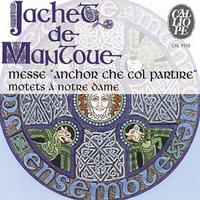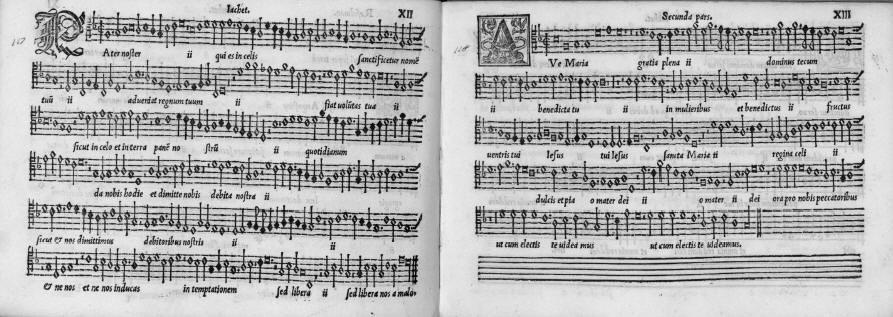Pater noster / Ave Maria
Composer: Jacquet de Mantua
Aliases: Jachet de Mantua, Jachet de Mantoue, Jacquet of Mantua,
Jachet de Mantova, Jacques Colebault, Jacobus Collebaudi

| Recording: not available |
|

|
CD: Jachet de Mantoue -
Messe "Anchor che col partire" - Motets a Notre Dame |
| MIDI / Lyrics: not
available |
| Score: |
|
source:
http://www.internetculturale.it/ |
 |
| |

| Posted on YouTube: Not available at
this time. |
|
You could be
featured here!
If you (or your choir) perform this Ave Maria, make a video recording.
Post your video on YouTube, email me the page URL and I'll embed the video
in this page. |

You can also email me an MP3 for audio only. |

| Internet
references, biography information. |
|
|
Jacquet de Mantua
From ChoralWiki
Aliases: Jachet de Mantua, Jachet de Mantoue, Jacquet of Mantua, Jachet
de Mantova, Jacques Colebault, Jacobus Collebaudi
Life
Born: 1483, Vitré
Died: 2 October 1559, Mantua
Biography:
French composer active in Italy. He was one of the leading composers of
sacred polyphony between Josquin and Palestrina. He was known simply as
Jacquet (Giachetto, Iachettus), and has often been confused with Jacquet
de Berchem. Details of his early years are lacking, but he was doubtless
related to the French singer Antoine Colebault, called Bidon, a favourite of
Leo X. Several north Italian manuscripts compiled around 1520 contain a
group of his motets. In 1525 he won support, along with Willaert, from Duke
Alfonso I. Jacquet and Willaert later jointly set psalms for double chorus.
About 1526 Jacquet turned his sights on Mantua, whose musical life he would
dominate for the next 30 years. He was granted citizenship in 1534 and from
then until 1559 he was titular maestro di cappella of Mantua Cathedral. His
status was unusual, however, in that he had direct responsibility not to the
cathedral or court but rather to a single patron, Ercole Cardinal Gonzaga
(1505–63), Bishop of Mantua, papal legate to Charles V and ultimately
president of the Council of Trent.
In response to his patron’s zeal for the Counter-Reformation, Jacquet
specialized in religious music almost to the exclusion of the secular. He
was prolific and one of the most widely published and admired composers of
his time. Scotto and Gardane undertook collected editions of his sacred
works. Aspice Domine, most famous of his motets, was known in over 40
sources, including seven instrumental intabulations. He won recognition from
the music-loving Medici popes Leo X and Clement VII. Theorists from
Lanfranco and Vanneo to Artusi and Cerone praised his works and ranked him
with Gombert and Willaert.
|

Please notify us of any
broken/defective links

Page last modified:
October 31, 2011
Return to my homepage:
www.avemariasongs.org

|
![]()